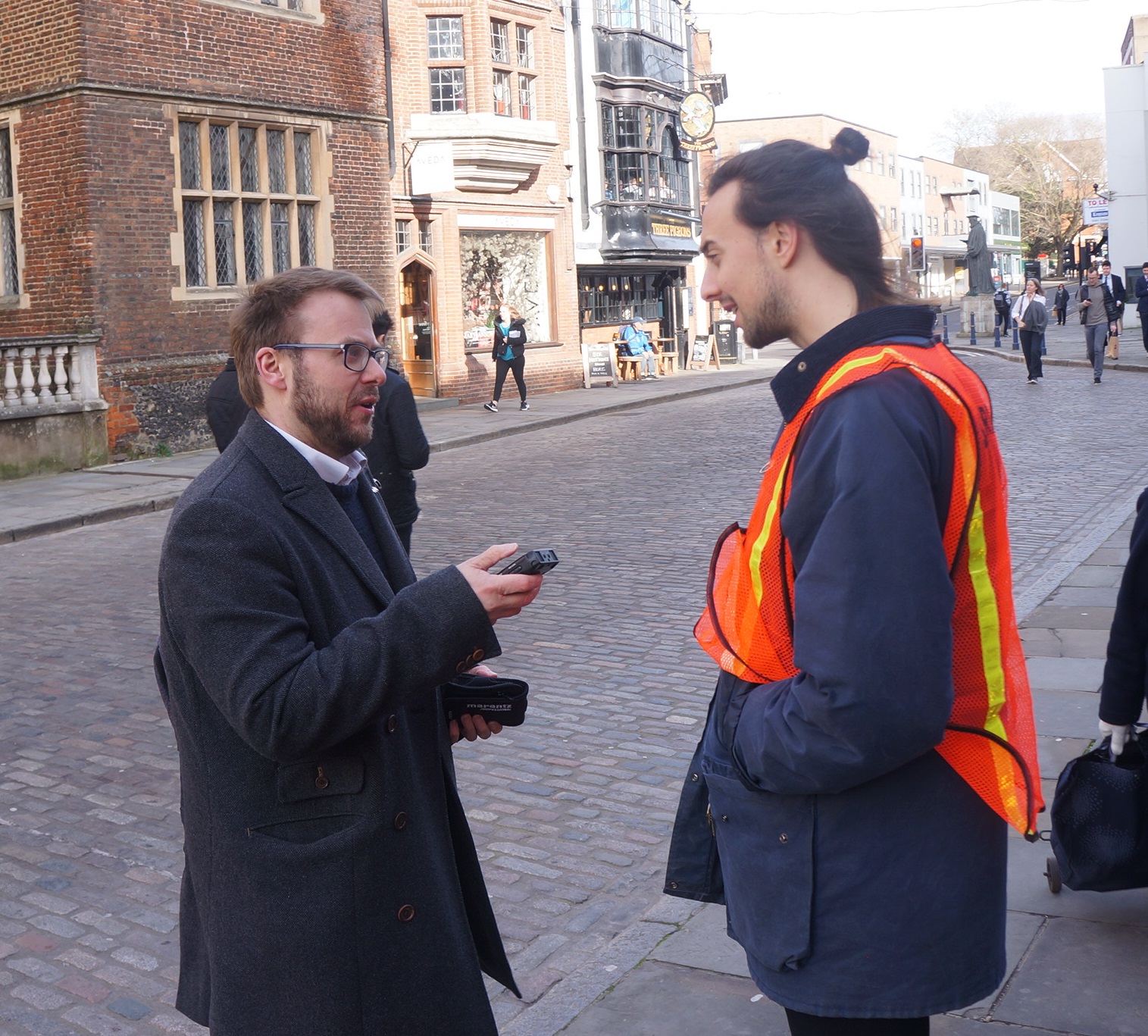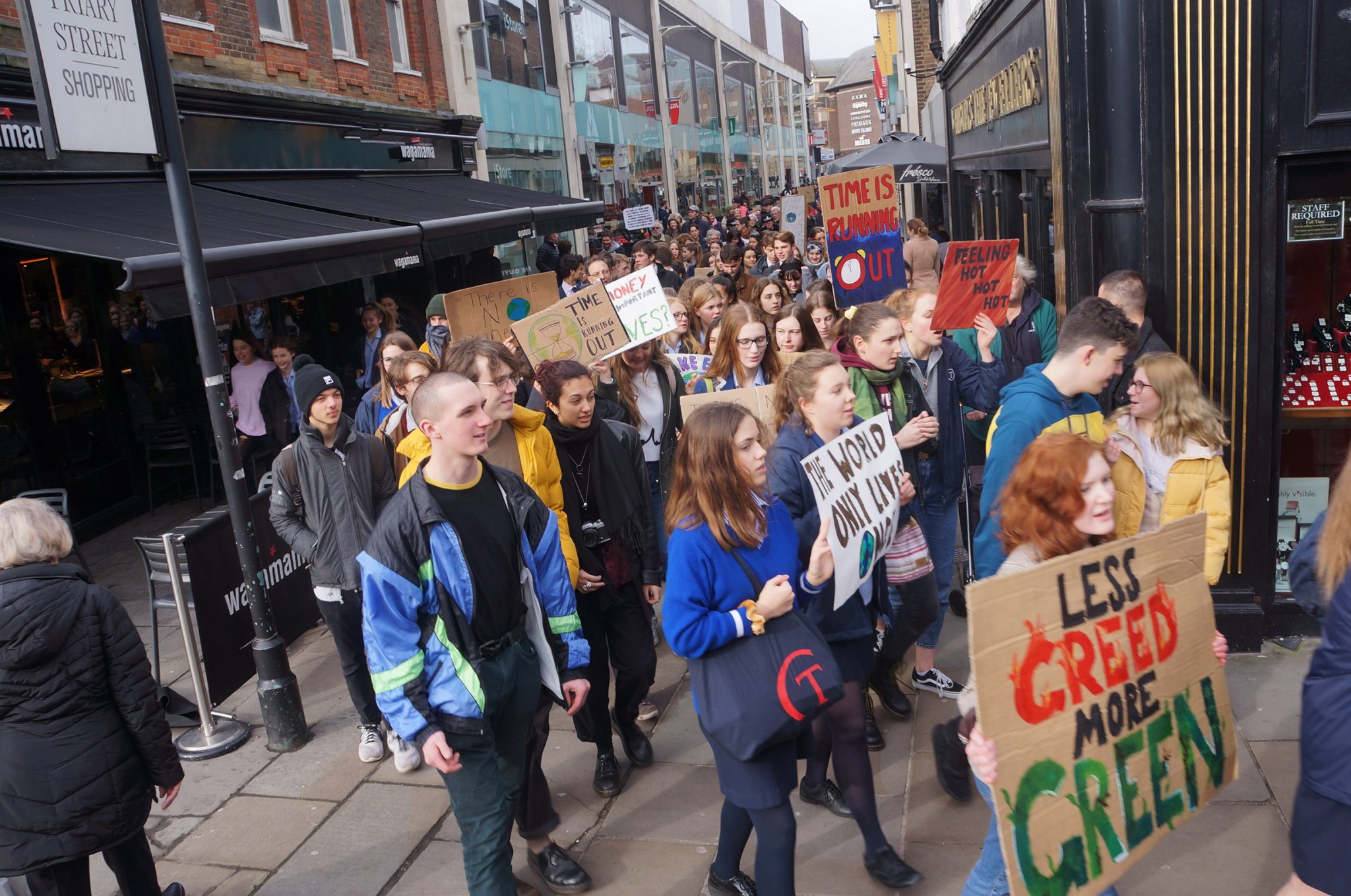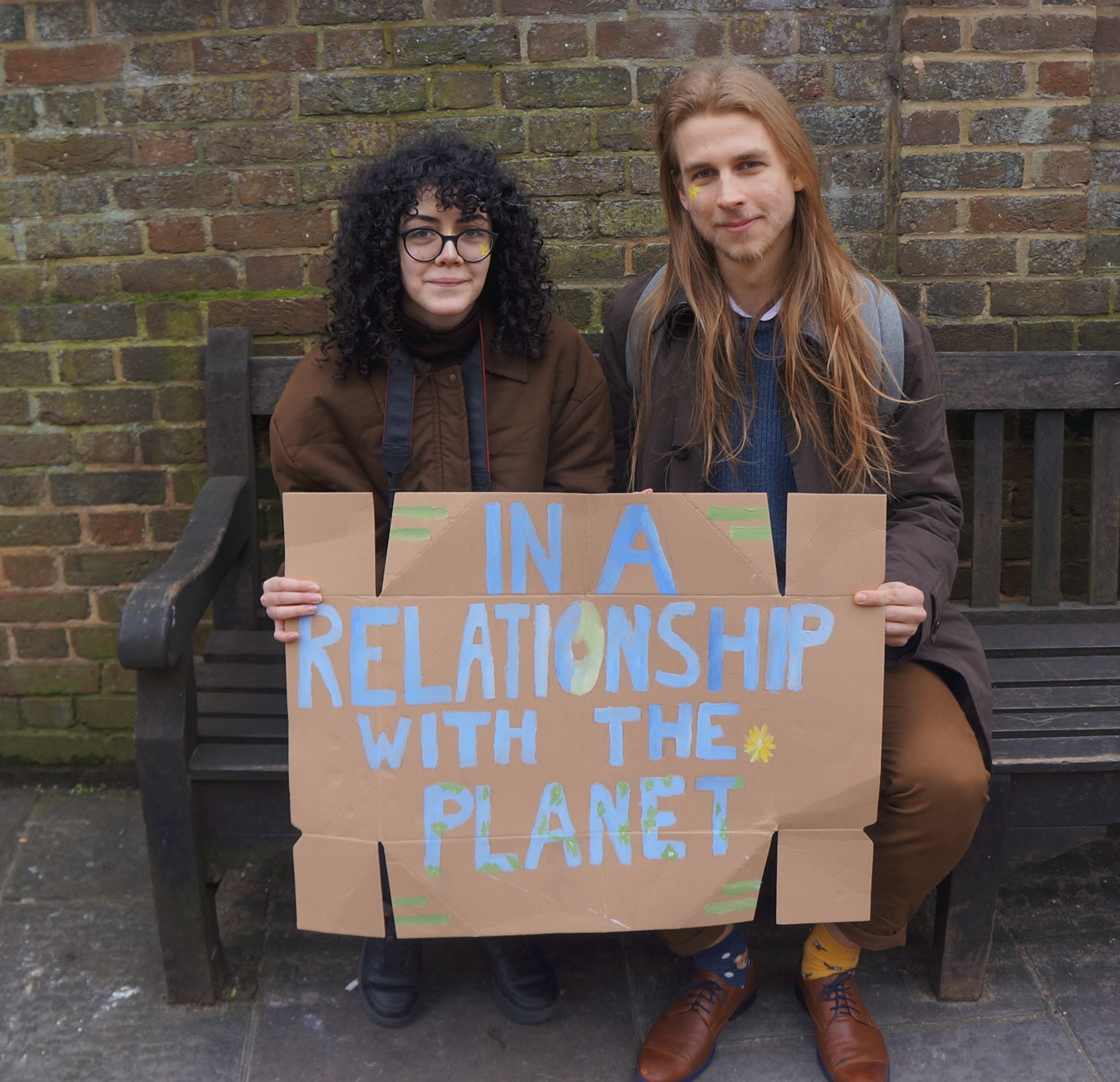 Abraham Lincoln
If given the truth, the people can be depended upon to meet any national crisis...
Abraham Lincoln
If given the truth, the people can be depended upon to meet any national crisis...
 Guildford news...
for Guildford people, brought to you by Guildford reporters - Guildford's own news service
Guildford news...
for Guildford people, brought to you by Guildford reporters - Guildford's own news service
Guildford Youth Continue Climate Protests In Town Centre
Published on: 14 Feb, 2020
Updated on: 14 Feb, 2020
About 150 protesters, mainly from local schools and the University of Surrey, marched in Guildford town centre again today (Friday, February 14).
The march was highlighting what they see as a lack government and local authority action on the climate emergency declared last year.

Young climate crisis protesters marched up Guildford High Street in a good natured protest against climate change.
Aidan Knox, a youth strike co-ordinator, said “We must keep the pressure on those in power to act on the climate emergency, to help save our future, and to mitigate the harm that the climate breakdown is already doing to millions of people across the world.”

One of the organisers, university student Aiden Knox, being interviewed by BBC reporter, Jack Fiehn.
Reaction by passers by was mainly positive. One couple said: “Well done to them. It’s wonderful what they are doing.”
Another man was less convinced that the protesters were going to make a difference. He said: “It’s f*****g rubbish. We can’t do anything about the climate changing anyway.”
While Ian Allen, 73, said he had joined the protesters on previous marches. He agreed that action by the government was needed.
He said: “It’s obvious to me that the weather has changed; you can’t deny it. I don’t know how enthusiastic Boris is about a climate change policy though.”
Responses to Guildford Youth Continue Climate Protests In Town Centre
Leave a Comment Cancel replyPlease see our comments policy. All comments are moderated and may take time to appear.

"Found any?" - "Nope, it all looks green to me!" (See Opinion: The Future is Congested, the Future is Grey)
www.abbotshospital.org/news/">





Recent Articles
- Latest Evidence in Sara Sharif Trial
- Ash’s New Road Bridge Is Named – and November 23rd Is Opening Day
- Class A in Underwear Leads to Jail Sentence
- Historical Almshouse Charity Celebrates Guildford in Bloom Victory
- Notice: Shalford Renewable Showcase – November 16
- Firework Fiesta: Guildford Lions Club Announces Extra Attractions
- Come and Meet the Flower Fairies at Watts Gallery
- Updated: Royal Mail Public Counter in Woodbridge Meadows to Close, Says Staff Member
- Letter: New Developments Should Benefit Local People
- Open Letter to Jeremy Hunt, MP: Ash’s Healthcare Concerns


Recent Comments
- Paul Spooner on Ash’s New Road Bridge Is Named – and November 23rd Is Opening Day
- Harry Eve on Opinion: The Future is Congested, the Future is Grey
- Nigel Keane on Letter: New Developments Should Benefit Local People
- Nathan Cassidy on Updated: Royal Mail Public Counter in Woodbridge Meadows to Close, Says Staff Member
- T Saunders on Opinion: The Future is Congested, the Future is Grey
- Jim Allen on Updated: Royal Mail Public Counter in Woodbridge Meadows to Close, Says Staff Member
Search in Site
Media Gallery
Dragon Interview: Local Artist Leaves Her Mark At One of England’s Most Historic Buildings
January 21, 2023 / No Comment / Read MoreDragon Interview: Lib Dem Planning Chair: ‘Current Policy Doesn’t Work for Local People’
January 19, 2023 / No Comment / Read MoreA3 Tunnel in Guildford ‘Necessary’ for New Homes, Says Guildford’s MP
January 10, 2023 / No Comment / Read More‘Madness’ for London Road Scheme to Go Ahead Against ‘Huge Opposition’, Says SCC Leader
January 6, 2023 / No Comment / Read MoreCouncillor’s Son Starts Campaign for More Consultation on North Street Plan
December 30, 2022 / No Comment / Read MoreCounty Council Climbs Down Over London Road Works – Further ‘Engagement’ Period Announced
December 14, 2022 / No Comment / Read MoreDragon Interview: GBC Reaction to the Government’s Expected Decision to Relax Housing Targets
December 7, 2022 / No Comment / Read MoreHow Can Our Town Centre Businesses Recover? Watch the Shop Front Debate
May 18, 2020 / No Comment / Read More














Steph Bleach
February 15, 2020 at 8:52 am
Gutted I missed the march but so encouraging to see so many young people standing up for their futures – and great to see a university presence too!
John Armstrong
February 15, 2020 at 3:52 pm
Frankly I think the universities should know better; politics and science do not mix, as many burned for heresy could testify.
The future of the young? I think they would do better protesting for the reinstatement of our industry and our pre-eminence in science and engineering so that they have decent jobs to go to.
Jim Allen
February 15, 2020 at 10:28 am
A question for all climate change enforcers and deniers.
Which contributes more to climate change? Painting your house once every two years with eco-friendly paint or every ten years with paint which remains in good condition for 10 years but is not eco-friendly? Taking into account solvents, sand paper, paint brushes and quantities of dust etc.
Dave Middleton
February 15, 2020 at 6:14 pm
Again, I commend the local protesters for making their point in a dignified and lawful manner, causing minimal disruption to the lives of their fellow citizens.
Something that Extinction Rebellion and other environmental type groups, should careful take note of.
John Perkins
February 16, 2020 at 11:22 am
Climate change is beyond doubt, and it is equally certain that it currently involves a rise in temperature.
Whether or not the rise can be extrapolated into the future is less so, but is acceptable as a premise.
Accordingly the question is whether or not mankind has caused or exacerbated that rise. The evidence for that is far less conclusive, though, in order to keep an open mind, it must be considered.
On the assumption that mankind is at fault, then there are two obvious ways to counter it.
One is to try to make complex decisions by balancing activities which release less greenhouse gas against those which release more.
The other is to reduce the number of humans to something the climate can sustain – and keep it there. Logically, reducing the population by 90% produces a similar reduction in CO2, whilst marching about demanding something be done produces a slight increase.
Sam Peters
February 17, 2020 at 1:55 pm
A few responses to comments above:
Jim – not sure to be honest. You could work it out, but realistically the difference might be so minimal in the grand scheme of things that it won’t matter much. Individual efforts can only go so far – without systemic change no amount of recycling, changing lightbulbs or eco-friendly paint will solve the climate crisis!
Dave – plenty of the Youth Strikers are part of Extinction Rebellion (XR), and vice versa. Like it or not, XR got climate change into the public debate over the last two years and continue to keep it there while now targeting businesses and governments directly, with minimal disruption to the public (see the recent actions outside the Department for Business, Energy and Industrial Strategy, at Gatwick, at coalmines etc)
John – population is certainly a part of the equation, but consumption is by far the biggest component at the moment. The poorest 4billion contribute just 10% of all emissions, while the richest tenth contribute over 50%. If we all lived like the poorest half of humanity, we could reach 40billion people before our emissions were the same as now.
Obviously there’s a population limit where everyone can live decent AND sustainable lives, but consumption is by far the most important issue currently. But then again, having read your last line, perhaps you’re not too concerned about the actual causes?
jim Allen
February 18, 2020 at 11:13 am
I can – It is far more destructive to the climate to replace while still working, than it is to newly manufacture and use less afterwards. ie longevity over single use.
In respect of changing light bulbs (when they stop giving out light) means most house wiring size could be reduced from 1.5 to 1 so a one third reduction in power requirement in new properties – installing solar hot water is a major refurbishment only suitable if re-plumbing an old house or on new builds, while solar electric can be easily installed and efficient in less than two days.
As for the progress by mother nature through her 1000 period cycles, sorry you will have to ask my great-great grand son…
Jules Cranwell
February 18, 2020 at 9:51 am
The students from UoS should turn their attention to the university’s plan to profit from the destruction of Blackwell Farm.
This will ruin areas of AONB, and be calamitous to the local environment.
How about a sit-in, in the vice-chancellor’s office, until the university changes tack.
Peter Elliott
February 19, 2020 at 12:47 pm
Quite agree, Jules, destroying all that beautiful countryside, and productive farmland, in order to build thousands of houses which the office of national statistics has said are surplus to local requirements, seems completely crazy to me.
John Perkins
February 19, 2020 at 2:33 pm
Using Sam’s figures, a reduction of 90% evenly distributed amongst the population (such as might be caused by a pandemic) would result in reductions in emissions of 9% by the poorest, 45% by the richest and 36% by the rest, or 90% in total.
Yes, if only the richest were to reduce their emissions by 90%, then there would be an overall reduction of 45%, which is proportionally a bigger benefit.
Human nature being what it is, that’s likely to prove difficult to achieve. Woe betide anyone who gives a baby a dummy and then tries to take it back!
To all live like the poorest half the rich would have to mostly give up using trains and boats and planes as well as cars, computers and mobile phones.
It isn’t enough to replace them by more eco-friendly versions as there is no evidence that eco-friendly things could reverse the trend.
However, that was my original point – new and more efficient things can only reduce emissions by the difference between the old and the new, certainly not to zero, and delivering them incurs a cost of its own.
Actual causes are complex and poorly understood, but for sure climate change was happening millions of years before modern consumerism and even before the advent of mankind.
It’s illogical to presume that I’m not concerned about them just because I’m critical of those who make a lot of noise, but achieve little.
I’m not saying nothing can or should be done, but organised protests CREATE emissions. Even if they persuade politicians to make new laws they are unlikely to have much beneficial effect on the planet as they are aimed at such a small proportion of humanity and only one of the possible causes.